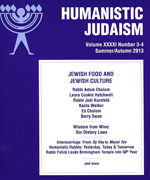Humanistic Judaism, Fall, November 1991
The collapse of communism in the Soviet Union is one of the most important events of the 20th century, equal in importance to the Bolshevik Revolution, which brought communism to power. For more than 70 years, all major political developments in both the West and the East evolved around the Bolshevik presence. Fascism, war, and the political tensions between Left and Right all were responses to communism, whether perceived as savior or devil.
In the early years of the revolution, thousands of Jews, both in and outside of the Soviet Union, shared the Bolshevik fervor. Caught up in its messianic enthusiasm, they believe that communism is the answer to anti-Semitism and the Jewish problem. But these devotees were crushed by the real realities of the communist system, which used anti-Semitism as a tool of social control. Enthusiasm was followed by disillusionment and the bitterness of betrayal.
Today, after 70 years of repression and isolation, the Jews of the former Soviet empire are free. They are confronted with both opportunity and danger. They have difficult decisions to make. Should they or should they not remain in the Soviet Union? What place should they give to Jerusalem and Judaism in their life? What kind of Judaism should they seek to embrace?
Lost for so long to the Jewish world, Soviet Jews have become a gold mine for Jewish recruitment. What do they choose to remain in the Soviet Union or to emigrate to Israel or North America, they are the largest body of unaffiliated you to suddenly appear as a major factor in the modern seen. Today, the “missionaries” of traditional and reform Judaism are busy looking for “converts”. And with books and videotapes, Lubavitchers have penetrated the remote cities and villages of the Soviet Union in search of followers.
Secular humanist a cutie as I’m cannot be indifferent to this new development and this new opportunity. After 70 years of secularization, most of your dues are not religious. If they never learn about the possibility of being both meaningfully secular and meaningfully Jewish, they would use traditional expressions that are inappropriate to their convictions and lifestyle, or-more likely-they will choose to do nothing about the Jewishness at all.
We, a secular humanist excuse, have a moral obligation to reach out to our Soviet Jewish brothers and sisters, wherever they may be. We need to share with them our experience that Judaism and humanistic convictions can go hand in hand. The task is overwhelming. But it also will be exciting and energizing for a movement.

